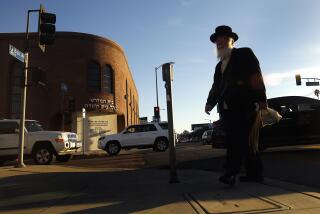Woman Leads Congregation : Rabbi Brings New Look to Temple
In her first sermon at Temple Sinai in Glendale, Rabbi Carole L. Meyers decided to directly address the issue of being a woman rabbi--and an unmarried woman rabbi, no less. But she decided to throw in a little humor.
One of the questions most frequently asked, she explained during Friday’s sermon, goes something like this: “If you call the rabbi’s wife the rebbetzin, then what do you call the rabbi’s husband?”
Her answer: “Lucky.”
That elicited an appreciative laugh and seemed to ease whatever tension remained in the congregation from seeing a rabbi leading Sabbath services wearing a prayer shawl over a dress.
First Full-Time Woman Rabbi
With that speech, Meyers, 29, formally became the first woman rabbi to head a congregation full time in the Los Angeles area. There are about 10 other women who hold rabbinical positions in the area, but all are either part-time or assistants, said Rabbi Lennard Thal, regional director of the Union of American Hebrew Congregations, which represents the Reform branch of Judaism. Temple Sinai, the only Jewish congregation in Glendale, is Reform.
“I’ve been a pioneer whether I liked it or not,” Meyers said in an interview in her new office. She moved to the 200-family Glendale congregation earlier this month after being an assistant rabbi for three years at an 1,800-family synagogue in Houston.
“It has been occasionally difficult,” she recalled. “It is unusual for some people if they’ve never seen a woman rabbi, never seen a woman read from the Torah.” Reading of the Torah by women is allowed in Reform and some Conservative Jewish congregations, but it is forbidden by Orthodox congregations.
“But my experience is that, once people become familiar with you, they put that aside and it becomes irrelevant,” she said. “Having said that, I would also want to add that I think there are things that women bring to the rabbinate that men traditionally haven’t. . . . I don’t want to call in all the stereotypes that all men are this way and all women that. But I think there is a certain informality, a certain depth of compassion, a certain verbal aptitude that some women bring that many men didn’t.”
The lay leaders of Temple Sinai said they spotted those qualities in Meyers while searching for someone to replace Rabbi Marvin Gross, who resigned after seven years with the congregation.
Jack Spillman, chairman of the search committee, recalls there being “an undercurrent of concern” about hiring a female rabbi, however, particularly an unmarried rabbi who is still in her 20s. “If the liturgy always refers to a third person, masculine, this takes a switch. There is a lot of tradition against her,” he said.
Nevertheless, Meyers won the membership over and was given a two-year contract.
“She is a brilliant speaker and handles herself in a remarkable way,” said Elizabeth Rosenblum, the temple’s president.
Rosenblum said she hopes Meyers will draw more Jews into the temple, which was founded 60 years ago and moved in 1948 to its present site at 1212 N. Pacific Ave.
“People may start out with the curiosity of seeing a woman, but I think they’ll stay on from there,” she said.
Reform Judaism ordained its first woman rabbi in 1972, and the Conservative movement in the United States accepted its first woman last year. There are about 100 women rabbis nationwide, rabbinical authorities say. Meanwhile, Orthodox Jews remain staunchly opposed, saying females in the rabbinate violate ancient traditions and rules.
Fears ‘Never Realized’
“From my vantage point, women rabbis are not nearly as much a curiousity as they were eight or 10 years ago,” said Rabbi Thal, who coordinates hiring for 65 Reform temples in the Southwest. “There were those who expressed doubt and misgivings whether they were going to find positions, except in the most sophisticated congregations. But those fears were never realized to any substantial degree.”
Thal’s hope, he said, is that the placement of a woman rabbi will be so commonplace in a few years that “it will no longer be considered news of any kind.”
The youngest of five children, Meyers was raised in a suburb of Washington. Her family was active in the local temple and her mother was elected its first woman president.
“We were constantly there. And I trace all the important values I have in my life to being brought up in that tradition,” she said.
Comfort From Rabbi
She recalled that, about the time of her bat mitzvah, at age 13, she vaguely thought about becoming a rabbi. The idea crystallized six months later when her father died and the family’s rabbi proved to be a source of deep comfort, she said.
“I thought, what better thing could I do with my life than to do for other people what that rabbi was able to do for me,” she said.
More to Read
Sign up for Essential California
The most important California stories and recommendations in your inbox every morning.
You may occasionally receive promotional content from the Los Angeles Times.










